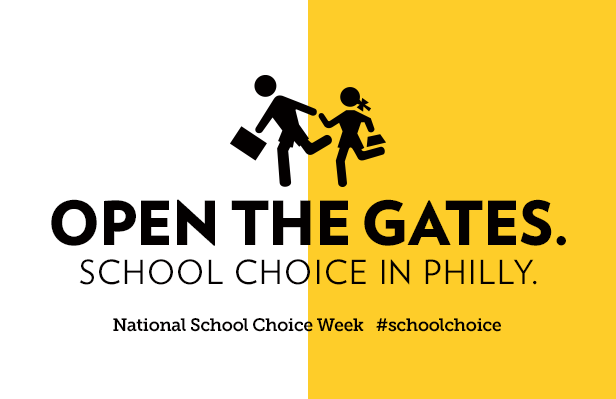Commentary

Open Floodgates of School Choice in Philadelphia
Note: This commentary was originally published in The Philadelphia Inquirer.
Have you ever felt trapped, unable to escape your circumstances or environment? For thousands of Philadelphia schoolchildren relegated to second-class schools, this nightmare is real.
The city's education crisis is no secret – and neither is the solution. In February, the School Reform Commission will have a chance to help free thousands of these students when it reviews applications from 12 public charter schools – only the second time since 2007 that new charters will be considered. If approved, these charters would give students a way out of the subpar schools now holding them back.
School choice – the notion that every child deserves access to the school that fits his or her needs best – has strong roots in Pennsylvania. Tax-credit scholarship programs, as well as charter, cyber, and home schools, are slowly eroding the zip-code-bound system that has long plagued the state.
Despite this, the SRC vote will be fraught with tension. Last year, Gov. Wolf stripped Bill Green of his SRC chairmanship after the commission approved just five new charters. In his place, Wolf put Marjorie Neff, the only commissioner to vote against all 39 charter applicants then under consideration.
This tension was again on display last week, when the SRC voted to place three failing district schools on the path to charter conversion. Neff was the lone no vote.
On the one hand are children desperate for an educational chance; on the other, a governor openly hostile toward choice.
As SRC member Sylvia Simms said, “My heart is heavy, and I have pent-up emotions about the way the district has allowed many of our schools in low-income neighborhoods to fail our students and their families. Families are literally crying for alternatives.”
She's right. Charter waiting lists in Philadelphia can number in the thousands as parents increasingly reject the status quo that consigns children to persistently failing schools. Demand for choice is so high that enrollment in MaST Community Charter School requires winning a lottery. The school admits less than 2 percent of applicants.
As we recognize National School Choice Week, it's time to free children from the straightjacket of educational stagnation and open the floodgates of opportunity.
The first step is bolstering Pennsylvania's successful tax-credit scholarship programs. The Educational Improvement Tax Credit (EITC) and Opportunity Scholarship Tax Credit (OSTC) allow businesses to redirect part of their state taxes to nonprofits that award scholarships to low- and middle-income families. More than 440,000 private scholarships have been awarded to Pennsylvania students since 2001.
In Philadelphia alone, schoolchildren benefited from nearly $16 million in EITC donations during the 2013-14 school year. EITC and OSTC donations are the lifeblood of schools like Philadelphia Classical School, a small private school on the corner of 11th and Vine Streets in the Callowhill neighborhood. They're also a lifeline for students who now have a brighter educational future.
This momentum must continue if Philadelphia is committed to offering children the opportunities they deserve. The EITC and OSTC programs should be expanded – doubled if not tripled – so that thousands more students can attend innovative schools.
City charter schools must also be encouraged. Philadelphia charter students receive the equivalent of 40 more days of reading and math per year than their district school counterparts, according to a recent Stanford University study.
On average, Philadelphia charters outperform district schools on state metrics. In the 2013-14 school year, the average School Performance Profile (SPP) score for the city's charters was 64.1, compared with 56.8 for district schools. Charters also came out ahead in SPP scores the previous year.
Naturally, charters should be held to the same standards as district schools. Mismanagement or a consistent lack of performance should not be tolerated.
Critics claim charters “drain resources” from the school system, but this zero-sum assumption collapses under scrutiny. In reality, charters spend – and receive – fewer dollars per pupil than district schools.
Embracing choice is not an indictment of public education. It's the fulfillment of public education's primary purpose: to give every child access to a quality education.
How can we expect any single school – public, private, or home school – to adequately serve the unique needs of every student who passes through its doors? We can't – and we don't have to – provided we open the floodgates of choice for Philadelphia's schoolchildren.
# # #
James Paul is a senior policy analyst for the Commonwealth Foundation (CommonwealthFoundation.org).